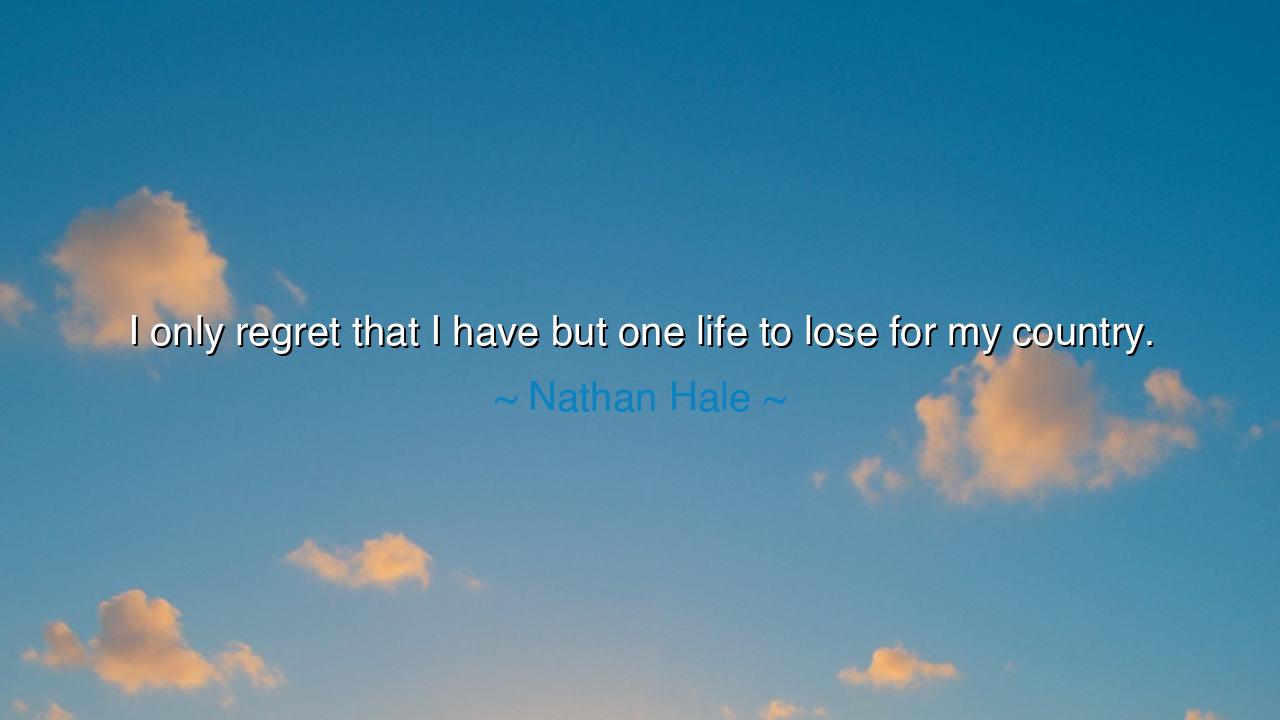
I only regret that I have but one life to lose for my country.






The immortal cry of Nathan Hale—“I only regret that I have but one life to lose for my country”—rings across the centuries like a trumpet call of sacrifice. It is not merely the lament of a man facing death; it is the exaltation of one who has discovered a cause greater than his own heartbeat. In these words, we see the soul of patriotism, the surrender of self to the service of a nation, and the eternal truth that some things are worth more than life itself.
The origin of this phrase lies in the crucible of the American Revolution. Nathan Hale, a young schoolteacher turned soldier, was captured by the British while on a mission of espionage. Condemned to die, he faced the gallows not with fear but with nobility. His final words, spoken at the threshold of eternity, were inspired by a line from Joseph Addison’s play Cato, which extolled the virtue of dying for liberty. Thus Hale joined his voice with that of the ancients, declaring that a man’s highest honor is to give his life for truth and for freedom.
What Hale reveals in this final utterance is the paradox of true courage: that one can regret only having too little to give, not too much. One life seemed to him a small offering before the altar of liberty. Where others might shrink from death, Hale longed for more lives, more chances, more sacrifices to pour out for his beloved country. In that moment, the self dissolved, and the cause became everything. His words remind us that love of country is not a shallow affection, but a fire that burns even when the body is bound.
History is filled with such examples of men and women who counted their lives as nothing in the service of something higher. Consider the Spartans at Thermopylae, who stood against a host too great to number. Knowing death awaited them, they did not retreat, but fought so their people might live. Like Hale, they gave what little they had—one fleeting life—and in doing so, they purchased immortality in memory and in honor. The courage of such souls tells us that the value of life is measured not in its length, but in its offering.
Yet Hale’s words are not only a hymn to patriotism but a summons to every human being. Not all are called to battlefields, nor to martyrdom, but all are called to give their lives for something beyond themselves. To live only for comfort, for wealth, or for pleasure is to squander the one life given. But to live for justice, truth, freedom, or love is to spend life wisely, to invest it in eternity. Hale’s regret is a mirror for us: do we give our life so fully that we might wish for more to give? Or do we cling to it so tightly that it slips away, empty and unoffered?
The lesson, then, is radiant and clear: life is not to be hoarded, but to be given. We must find our cause, our “country,” whether that be a nation, a family, a community, or a truth worth defending, and pour ourselves into it with fearless devotion. For the one who holds back in fear will die a thousand quiet deaths, but the one who gives boldly will live forever in the memory of mankind.
Practically, let each person seek the cause that ignites their heart. Ask: what is worth my one life? And when it is found, live as Nathan Hale died—with courage, with dignity, and with an offering that leaves no room for regret. Be willing to sacrifice time, comfort, and even safety for what is just and true. For though we each have but one life, it can, if given rightly, echo across ages, inspiring generations to rise and walk the path of courage.
Thus, Hale’s final words remain a torch in the darkness: though the body perishes, the spirit that gives all for freedom and truth cannot die. To lose one life is small; to live without sacrifice is the greater tragedy. Therefore, let us live—and if need be, let us die—in such a way that our lives, like his, shine as offerings to the eternal cause of justice.






AAdministratorAdministrator
Welcome, honored guests. Please leave a comment, we will respond soon